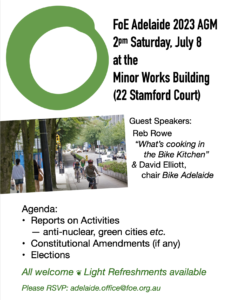Very bad advice: $368b nuclear submarines and the Federal budget
Brian Toohey has some excellent advice on the matter of submarines…
… Read more >>An objective study would’ve shown the latest conventional ones are superior – they are much harder to detect and are operationally available far more often because they don’t suffer few serious maintenance problems. The program cost of twelve high quality conventional subs is only about $18 billion compared to $368 billion for 11 nuclear ones that repeatedly break down.
…
Vice Admiral Jonathan Mead gave an astonishing interview to the Guardian published on March 8 and 9 this year. Mead wrongly described Australia’s existing Collins class conventional submarines as “the most advanced in the world”. They are certainly not. They lack modern equipment such as fuel cells and advanced batteries that let submarines operate extremely quietly for sustained periods without having to rise to the surface to recharge their batteries every day or two, unlike the Collins class. Modern German, Japanese and South Korean ones are in this category. These submarines have low sustainment costs, unlike the Collins class where this burden has hit almost $700 million a year, not including fuel and crew costs. Taking the Collins out of service would free up billions in funding for new conventional submarines.
Because nuclear subs are significantly bigger than most conventional subs, they are easier to detect as they move through the earth’s magnetic field and the water column. Rapid advances in sensor power and computer processing increase the chances of subs’ detection – and destruction. Mead said he had taken account of the prospect oceans would become more transparent by 2050.His solution is to use underwater drones in places where you don’t want a nuclear submarine to be detected. That would be just about everywhere that the presence of nuclear submarine was supposed to be important. Apparently, the nuclear sub would control a drone at a safe distance.
AUKUS and the implications for Australia’s domestic nuclear landscape
National anti-nuclear campaign online meeting: Saturday morning May 27
The purpose of this meeting is to strengthen our collective anti-nuclear campaign work with an emphasis on the risks that AUKUS will:
- i) strengthen the push for domestic nuclear power (at the expense of the necessary and happening renewable energy transition)
- ii) facilitate national and international nuclear waste dumping in Australia
- iii) facilitate more uranium mining and potentially other steps in the nuclear fuel cycle such as uranium enrichment
- iv) undermine federal Labor’s commitment to signing and ratifying the Treaty on the Proliferation of Nuclear Weapons.
- We won’t be discussing the deeper militarism and foreign policy concerns around AUKUS but will focus on the domestic nuclear sector risks outlined above.
People interested in and involved in anti-nuclear campaigning are invited to attend and help develop a platform to ring-fence and constrain the wider pro-nuclear momentum the AUKUS plan is generating.
Please RSVP to jim.green@foe.org.au or dave.sweeney@acf.org.au
Date and time: Saturday May 27, 10.30am to 12.30 pm eastern time, 10am SA, 8.30am WA. Zoom details below.
For background see the ACF paper: AUKUS and Australia’s Nuclear Landscape – ACF – May 2023 .
See also David Noonan’s paper on AUKUS and nuclear waste online.
Schedule: 4 x 30 minute sessions
Nuclear Power ? lead speakers Jim Green (FoE) and Trevor Gauld (ETU)
Waste
— proposed national dump at Kimba: speakers tbc
— intermediate and international waste: David Noonan
Uranium: Mia Pepper (CCWA) and Dave Sweeney (ACF)
Weapons: ICAN speaker/s
Zoom details
Join Zoom Meeting:
https://us02web.zoom.us/j/9256268989?pwd=OFVmNkhYdVFSWnhidUFXYVZGSmZxUT09
Meeting ID: 925 626 8989, Passcode: 3101952
A date for your diary: Adelaide FoE AGM 2pm July 8th
We will be meeting at the Minor Works Building off Sturt Street.
Details will be mailed out to members shortly.
Outrageous anti-protest laws
Clearly the SA government was annoyed by the protests at the APPEA conference: by the Thursday of that week, the lower house had passed legislation dramatically increasing penalties for public protests.
If you are concerned about this threat to democracy, come to the snap protest this Friday, May 26th at 6pm at Parliament House. Event by Adelaide Uni Students for Climate Justice, Adelaide Campaign Against Racism and Fascism and others
Earlier this week, the Human Rights Law Centre released an explainer which revealed many of the problems with the ill-considered legislation
… Read more >>The Bill: Summary Offences (obstruction of Public Places) Amendment 2023 (SA)
On 18 May 2023, the South Australian Legislative Assembly introduced, and passed, the Summary Offences (Obstruction of Public Places) Amendment (The Bill) in response to protest activity in Adelaide which briefly closed traffic. The Bill amends section 58 of the Summary Offences Act 1953 (The Act) to, among other things, dramatically increase the maximum penalty for obstructing a public place. The Bill is currently before the Legislative Council for deliberation.
…Section 2(1)
2(1)
Section 2(1) of the Bill increases the penalty for obstructing a public place from $750 to a maximum of $50,000 or a maximum term of imprisonment of 3 months. This is a 60-fold increase to the maximum financial penalty; the Act does not currently provide imprisonment as a penalty for obstructing a public place. It is intended that these penalties would have a strong deterrent effect to protestors who block public space.
…
Section (3) (1a)
Section (3) (1a) of the Bill makes defendants criminally responsible for their direct obstruction of a public place, but it also intends to capture conduct even if it indirectly causes obstruction of a public place.
The Bill provides an example of what this may include, namely, if police or other emergency services need to restrict access to the public place to, “safely deal with the person’s conduct”.

